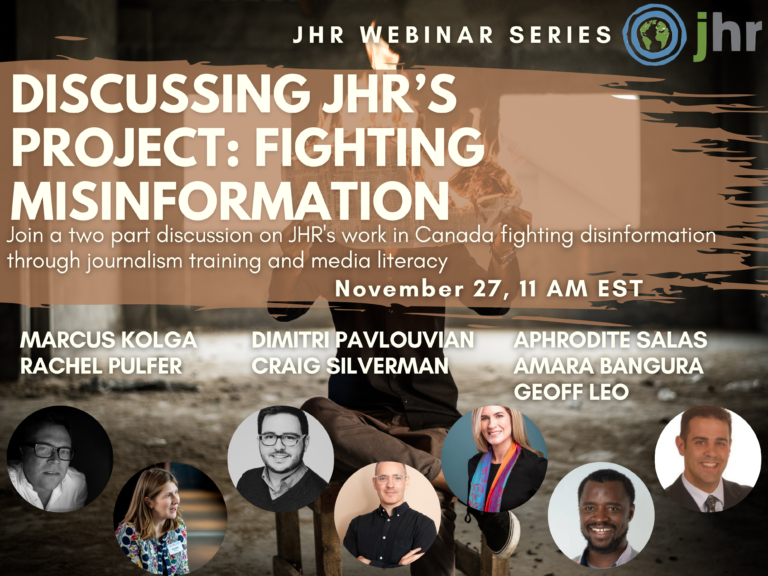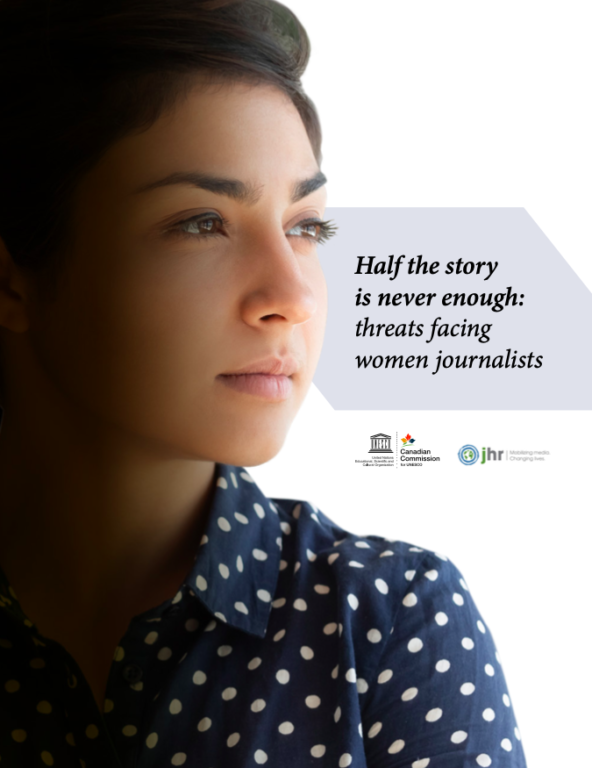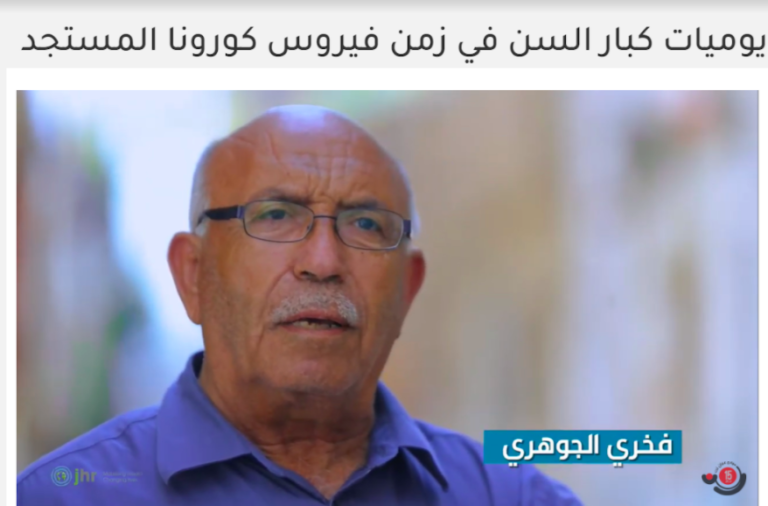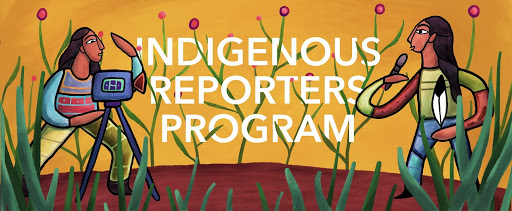This week’s highlights
-
November 27 – Tune in to JHR’s next webinar: Fighting Disinformation in Canada with Craig Silverman, Aphrodite Salas, Geoff Leo and Marcus Kolga
-
November 20: This World Children’s Day, listen to this podcast ‘Nshiime’ by Kristina Nodin, 11
-
Just Published ! Half the Story is Never Enough: JHR partners with CCUNESCO and World Press Freedom Canada to Spotlight Challenges Women Journalists Face Worldwide
-
JHR Jordan journalist investigates the impact of COVID-19 misinformation on the country’s elderly
-
The Dutch Embassy in Ottawa’s Podcast with JHR’s Team Leader and Media Trainer in Jordan, Mohammed Shamma
On November 27 Find out More About Fighting Disinformation About Covid-19 in Canada
In spring 2020, supported by Canadian Heritage, Journalists for Human Rights ran a pilot project training both journalists and the general public in Canada on tools needed to debunk disinformation and misinformation about covid-19 both in media and online.
From 11am to noon EST on November 27th, join disinformation expert and curriculum advisor Craig Silverman, journalism and media literacy trainer Aphrodite Salas from Quebec, journalism trainer Geoff Leo from Saskatchewan, disinformation expert Marcus Kolga, a media literacy expert from CIVIX Canada, and JHR executive director Rachel Pulfer to unpack early results from the project and discuss next steps. To register:
https://jhrevents.ca/live/discussing-jhrs-project-fighting-misinformation?acq=NQDB
November 20 is World Children’s Day: Listen to the Podcast ‘Nshiime’
Kristina Nodin, 11, is producing Nshiime Voices, a weekly webcast, in Thunder Bay
Kristina Nodin, 11, is sharing stories in her community and beyond in a weekly webcast.
Nshiime Voices – Nshiime meaning “my sibling” in Anishnaabemowin – is a space to share experiences and find out more about some of the interesting people doing great things in and around Thunder Bay.
Kristina is smart, thoughtful, and game to try new things. She would like to explore a career in journalism and is well on her way to doing just that!
Listen to the podcast here: https://soundcloud.com/user-466959563/nshiime-voices-episode-2/s-ikYad4unv3n
Half the Story is Never Enough
The Canadian Commission for UNESCO (CCUNESCO), World Press Freedom Canada and Journalists for Human Rights are proud to bring you a unique series of papers from women journalists from across the globe. The papers are now available on all three organizations’ websites including JHR’s publications page, here.
This December 2 from 9:30 to 10:30am EST, all three organizations will sponsor a webinar bringing the authors together in conversation to discuss common themes from their papers, in advance of the UNESCO World Press Freedom Conference on December 9 and 10 in the Hague.
As journalist Sally Armstrong notes, if women aren’t able to tell stories about women and girls, we’re missing half the story. These papers help shed light on the nature of the challenges women journalists face, and how key stakeholders including newsroom managers as well as the international community can help mitigate the impact of those threats.
Stay tuned for a webinar registration link!
JHR Jordan journalist investigates the impact of COVID-19 misinformation on the country’s elderly
Photo Credit: ammannet.net
JHR Jordan produced a video story about eldery diaries during COVID19 pandemic, and how they perceived the media coverage of it. The journalist, Ahmad Hamdan, interviewed elderly people who expressed their concerns and their feedback on the misinformation that spread about COVID-19 and its severe effect on old people.
Watch the video in Arabic here.
Meet JHR Jordan’s Mohammad Shamma on a Podcast in Collaboration with the Dutch Embassies in Ottawa and Amman
Mohammed Shamma
As part of the Global Conference on Media Freedom, the Dutch Embassy in Ottawa broadcasted a podcast with JHR’s Mohammed Shamma, media trainer in Amman, Jordan.
A leading voice covering human rights in the region, Shamma has worked with JHR in Jordan since 2014. He has produced and presented several leading radio shows at the main community radio in Amman, Balad Radio, besides producing a series of documentaries focusing on human rights. He also collaborates with several media outlets based in both the Middle East and Europe.
JHR’s program in Jordan has supported the capacity building of fresh graduates, young journalists and journalism students on human rights reporting, digital rights, labour rights, women’s rights and refugee rights during the last five years. It has developed a reputation for supporting new and alternative media. The JHR team in Jordan succeeds in publishing high quality stories in different media outlets as well as help freelancers to find ways to practice their own skills through JHR by receiving mentoring and coaching for the stories they want to publish.
During the last four years, JHR and the Dutch Embassy in Amman, Jordan worked together in Jordan to enhance media capacity in covering and reporting human rights issues. JHR has trained over 120 journalists on journalism techniques, the majority of which were women, in particular on human rights storytelling. JHR has also conducted long term mentorship programs, and produced more than 110 human rights stories.
Listen to the podcast here.
Call for Expressions of Interest: Bursaries and Internships Supporting Indigenous Voices
JHR’s Indigenous Reporters program is currently seeking expressions of interest from emerging Indigenous journalists in Canada to work on bursary and internship opportunities available with leading media organizations across Canada.
The bursaries and internships are open to Indigenous (First Nations, Métis, Inuit) youth working or seeking work in media, or currently enrolled in a media or journalism program at a Canadian post-secondary institution.
Deadline to apply: November 30, 2020. Find all information here.








